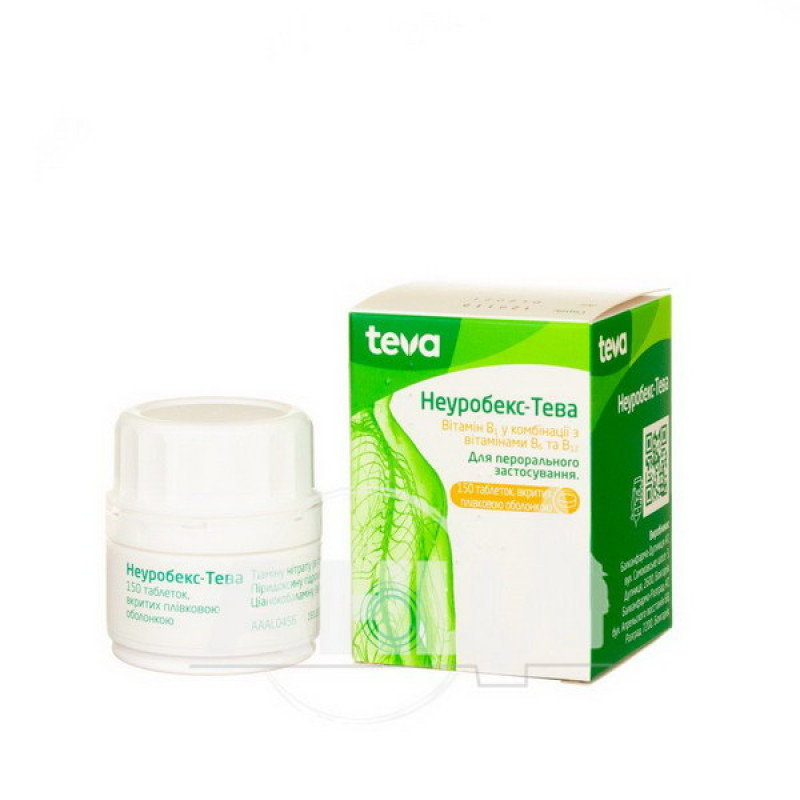Neurobex film-coated tablets, can No. 150

Neurobex-Teva tablets are used in the complex treatment of neuritis, polyneuritis and neuralgia, such as:
trigeminal neuralgia; intercostal neuralgia; sciatica; lumbar syndrome (lumbago); plesitis (cervical and brachial plexuses); radicular neuritis due to degenerative diseases of the spine; prosoplegia (facial nerve damage); post-infectious and toxic lesions of nervous tissue in alcoholism, diabetic polyneuropathy, drug intoxication.Composition
One tablet contains (active ingredients):
thiamine nitrate (vitamin B1) - 15 mg; pyridoxine hydrochloride (vitamin B6) - 10 mg; cyanocobalamin (vitamin B12) - 0.02 mg.Excipients: lactose monohydrate, wheat starch, talc, magnesium stearate, colloidal silicon dioxide, povidone, Kollicoat Protect, titanium dioxide (E 171), Ponceau 4R (E 124).
Contraindication
hypersensitivity to thiamine nitrate, pyridoxine hydrochloride, cyanocobalamin and any other components of the drug; vitamin B1 is contraindicated for use in allergic diseases; vitamin B6 is contraindicated for use in gastric and duodenal ulcers in the acute stage (since increased acidity of gastric juice is possible); vitamin B12 is contraindicated for use in erythremia, erythrocytosis, thromboembolism.Method of application
"Neurobex-Teva" should be taken orally during or after meals, without chewing, with water.
Adults should be prescribed 2-3 tablets 3-4 times a day for 30 days.
The individual dose and duration of treatment is determined by the doctor.
Application features
Pregnant women
The drug should be prescribed only after careful assessment of the benefit-risk ratio for the mother, as there is insufficient data on the safety of the drug during pregnancy.
Vitamins B1, B6 and B12 are excreted in breast milk. High concentrations of vitamin B6 may inhibit lactation. Studies on the degree of secretion of vitamins into breast milk have not been conducted. The decision to discontinue breastfeeding or use of the drug should be made taking into account the need for the drug for the mother. If necessary, breast-feeding should be discontinued for this period.
Children
The medication should not be prescribed to children.
Drivers
The drug does not affect the ability to drive or operate complex mechanisms. If dizziness occurs during treatment, you should refrain from driving or operating machinery.
Overdose
In case of overdose, adverse reactions associated with the use of the drug are intensified. Nervous excitement, tachycardia, and pain in the heart area may occur.
Vitamin B1 has a wide therapeutic range. Very high doses (more than 10 g) exhibit a curare-like effect, inhibiting the conduction of nerve impulses.
Vitamin B6 has a very low toxicity. Long-term use (over 6-12 months) in doses of more than 50 mg of vitamin B6 per day can lead to peripheral sensory neuropathy. Excessive use of vitamin B6 in doses of more than one g per day for several months can lead to neurotoxic effects. Neuropathies with ataxia and sensitivity disorders, cerebral seizures with changes in the EEG, and in isolated cases hypochromic anemia and seborrheic dermatitis have been described after administration of vitamin B6 in doses of more than 2 g per day.
Vitamin B12: after parenteral administration (in some cases - after oral administration) of more than recommended doses of the drug, allergic reactions, eczematous skin disorders and benign acne have been observed. With prolonged use of vitamin B12 in high doses, liver enzyme activity disorders, pain in the heart area, and hypercoagulation are possible.
Treatment
Gastric lavage, administration of activated charcoal and symptomatic agents. Isoniazid should be used as an antidote to vitamin B6.
Side effects
Side effects are unlikely when taking the drug. In some cases, the following side effects are possible when taking the drug in this dosage form.
On the part of the nervous system: long-term use (over 6-12 months) in doses of more than 50 mg of vitamin B6 daily can lead to peripheral sensory neuropathy, nervous excitement, malaise, dizziness, and headache.
Gastrointestinal tract: gastrointestinal disorders, including nausea, vomiting, diarrhea, abdominal pain, increased acidity of gastric juice.
Immune system disorders: hypersensitivity reactions, increased sweating, shortness of breath, anaphylactic shock, anaphylactic shock.
On the part of the endocrine system: high concentrations of vitamin B6 may suppress lactation.
Cardiovascular system: tachycardia, collapse.
Skin: allergic reactions, including itching, rash, urticaria.
Storage conditions
Store at a temperature not exceeding 25 °C, in a dry place, out of the reach of children and protected from light.
Shelf life - 2 years.
There are no reviews for this product.
There are no reviews for this product, be the first to leave your review.
No questions about this product, be the first and ask your question.










